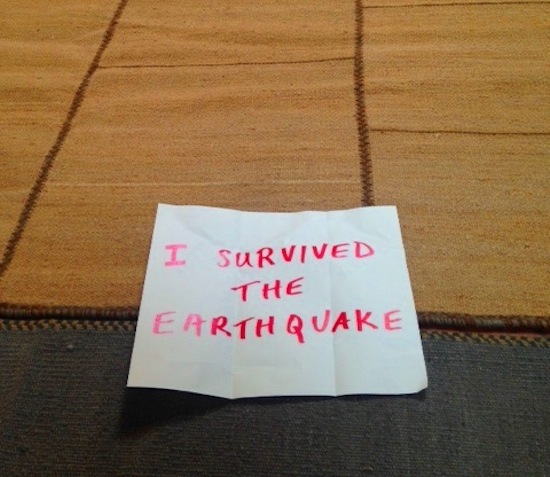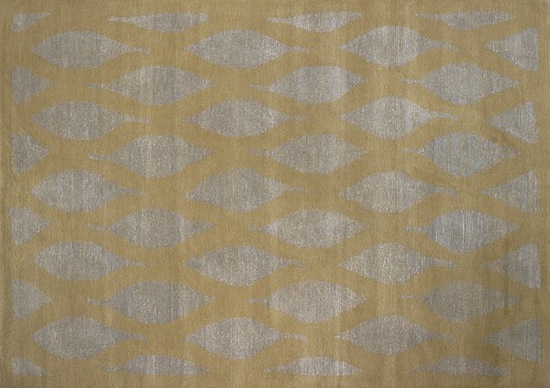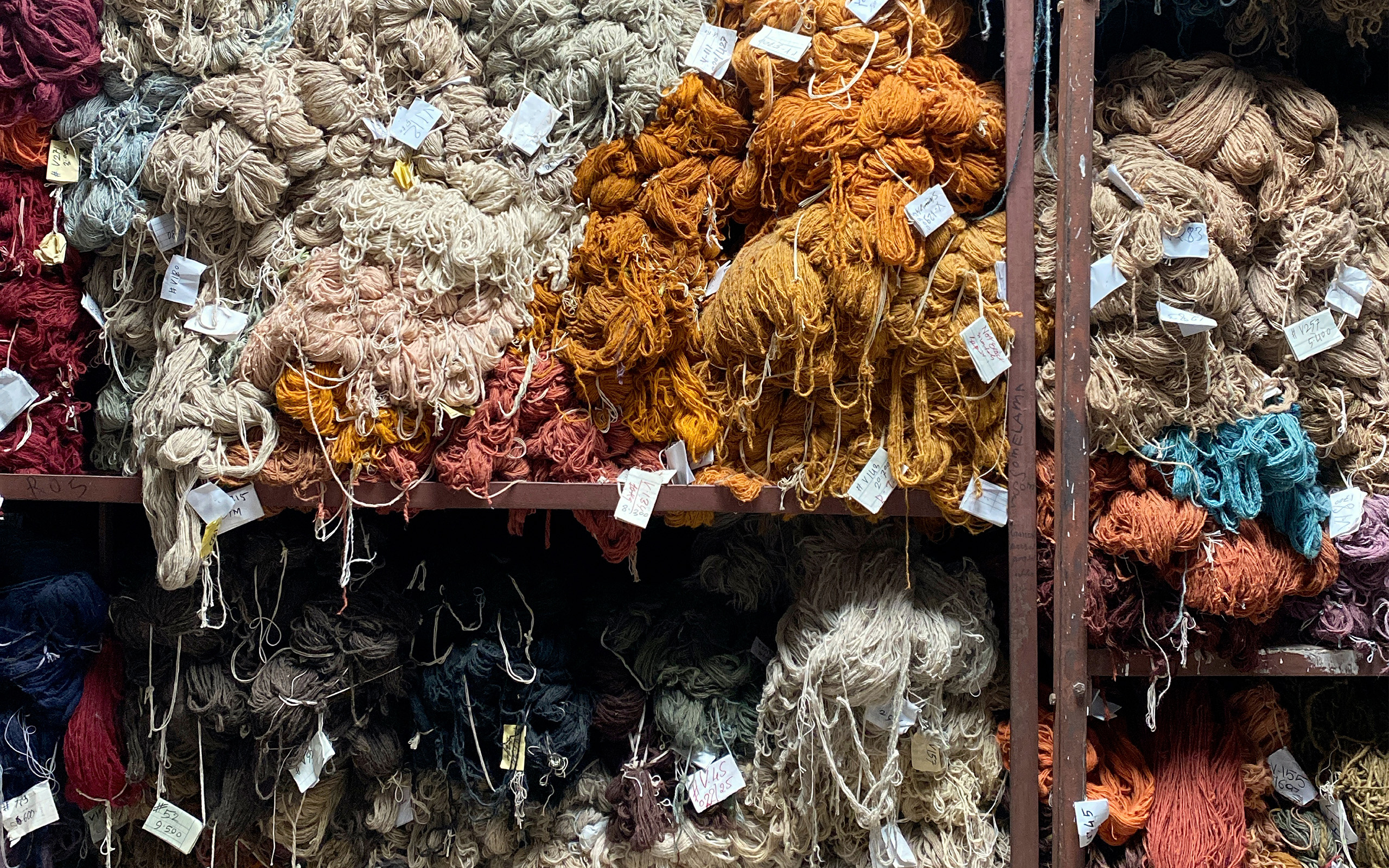‘Now everything is back to normal.’ are the words that remain vivid in my mind. They had been spoken by a Nepali carpet maker as we discussed the current situation in Nepal. A mere (4) months hence from The Great Quake of Nepal and everything is back to normal. Despite the somber loss of life, the destruction of sites historic and otherwise, and the untold problems currently facing those in Nepal, everything is normal. Normal. He is not entirely wrong. Everyday people get up and go about their lives, perhaps differently than they did prior to 25 April 2015 perhaps not, but living their lives none the less – including of course making carpets. It’s a simple reminder that while the toll – human and otherwise – may have been severe, it could have been far worse. For those now in Nepal, life must move forward, infrastructure must be repaired or rebuilt, work must continue. As we find ourselves at this arbitrarily defined anniversary of sorts we must now wade into a discussion of what role the carpet industry plays in genuinely helping the Nepali people rebuild their country by asking: are we the well intentioned partners we imagine ourselves to be or are we modern day carpetbaggers?
It would be disingenuous to begin this discussion without first acknowledging all of the good that the rug industry has done thus far for Nepal. In the wake of the Earthquakes the industry responded en masse to raise funds not only for immediate relief but also the long term recovery. Individual showrooms held events, importers offered matching contributions and percentages of sales, non-profits related to the industry responded, opinionated writers called upon consumers to show real empathy, so on and so forth were our collective if not mostly uncoordinated efforts to assist those in need. And for the most part they have been a success raising untallied sums for our friends in Nepal. We should, if you’re inclined, be proud of these accomplishments, but it was on the occasion of one such of these events that the delicate line between opportunity to help and the potential for opportunistic carpetbagging became readily apparent.
I was honoured and flattered to be personally invited as The Ruggist to attend a fund-raising event held by Interior Surfaces on Friday 14 August 2015 in Halifax, Nova Scotia. For those not familiar, Interior Surfaces produces a collection of beautiful Nepali made carpets designed by Melanie Munden and presented under the moniker of mekizodesigns. Not unlike everyone else making in Nepal, their producer had suffered various losses but was, as we all must, persevering and returning to normal. Out of genuine concern and in effort to help in their own way Melanie and her husband (and owner of Interior Surfaces) Richard Munden did what so many others have done; they organized a beautiful event to raise money for those in Nepal. At the end of the night they raised $7,897.00 (CAD), all of which will be sent to assist their producer and his weavers in rebuilding. It was by all accounts a wonderful and successful event, with one tiny exception. So tiny in fact, it could go without notice, but for the fact I was already thinking of the notion of opportunity versus opportunistic when I heard the saccharine words that, while not spoiling anything, represent the tip of the iceberg of how an event could go horribly wrong.
The event had all the hallmarks one would expect to find at such an affair. Locally donated food and drink, silent auction items (including two (2) custom rugs from mekizodesigns), live music, a stunning venue, a small cash donation at the door, and a variety of guests adorned in their finest of black clothing. While originally planned for Interior Surfaces own Studio, when a colleague heard of the event, he suggested it be moved to the the sales centre of his company’s new condominium development for which Interior Surfaces had previously supplied the broadloom and carpets. It was a great opportunity to show off product in situ to a vetted audience of clients who actually buy such wares. When the expected ‘Thank you for coming…’ speeches began, it was a touching and heart lifting affair. Richard and Melanie briefly mentioned and thanked the major donors, dutifully reminded everyone of the silent auction, and suggested that even if you cannot donate, you can help in your own individual ways. Melanie spoke passionately about how important family is to her, and how the families of the weavers in Nepal had been affected. At this point the aforementioned colleague was asked to speak on behalf of the condominium developer. He feigned some concern about only being the ‘mingle master’ or some other drivel and unceremoniously passed on speaking. In his stead, the always prepared to speak on point (as she should be) public relations person from the developer took the stage unplanned. She then said amongst other things…
‘We too care about families, and building families, that’s what [NAME IRRELEVANT] is about, building places for families.’
It made me cringe inside and I though ‘Really?! We’re standing in a condominium sales centre. We know what you do.’ In her defence, she was shooting more or less from the hip, and under the circumstance performed exceptionally well. I imagine that had she been fully prepared to speak before the gathered crowd, her message would have been that much better. The crowd of course showed no visible reaction to her comments, nor should they have as it was only apparent to me because, as I said, I was already thinking about the implications.
So where is this mysterious line between opportunity and opportunistic of which I allude? It lies somewhere, in this example, between merely hosting the fundraiser at your condo sales centre and – by stepping over the murky line placement – actively promoting and selling units. In my example this did not in any way happen, yet thanks in no small part to years of Rug Industry Brand Cynicism®, we can see the rest of the treacherous iceberg that is the opportunistic hard sell lurking precariously close. It is one we should avoid at all cost while simultaneously balancing our true intention to help with the need to sell our wares. Even if one of the ways we’re helping is by doing precisely that.
In the article ‘Consumers Must Show Real Empathy for Nepal‘ (which has been quoted in print in both the Rug Insider and COVER Summer 2015 issues) I assert that ‘The inarguably minor, trivial, and inconsequential inconveniences you may experience by your current and future business are worth more to the long-term recovery of Nepal and its people, than any amount of charity or counterfeit claims of concern.’ and that Nepal will recover …’only if we keep buying Nepali made rugs and carpets.’ seemed to have struck a chord within the rug industry. By writing those words, I wanted to remind consumers, importers, makers, et cetera
and so forth, of the importance of continued and perhaps increased business with Nepal. I did not foresee (as perhaps I should have) that very sentiment being portrayed as some sappy overly emotional Sarah McLachlanian ‘Won’t someone think of the [BLANK]!?!?!?! – We NEED you to buy rugs now!’ call to push product – as some cheesy and unsophisticated emails we’ve received would have us believe. This latter notion, like the hard sell for rugs and carpets or any other tangentially related product is toxic to our real purpose.

There is a degree of tacit humour if not also levity in this simple note: ‘I survived the earthquake.’ We smile and laugh because it gives voice to an inanimate object. We can also smile knowing that those carpets, like all the others that survived the quake, were, packed, inspected, washed, shipped, et cetera so on and so forth by people who too can say ‘I survived the earthquake.’ What a simple joy it is to be alive, to be able to say ‘I survived the earthquake.’ and, as time advances, to be able to return to normal. That is what any effort to help those in Nepal should be about, returning to normal.
Just as my friend’s life in Nepal is returning to normal, so too is life for everyone else. Even tourism numbers, which were down significantly – according to some sources as much as ninety-percent (90%) in the months immediately after the Great Quake – are rebounding to relatively normal levels. In short – and perhaps with a nod to the Buddhist concept of impermanence – as the new normalcy returns to life for our friends so too must it return to the way we sell our rugs and carpets.
At the encouragement of a dear friend I briefly entertained the concept of organizing a broad industry fundraiser for Nepal that would have taken place on the sixth month anniversary of the Great Quake. To gauge interest I polled various importers I know, asking for their thoughts, opinions, willingness to participate, and the like. Various logistical concerns aside, and now armed with the concrete insight from the Interior Surfaces event, I feel confident in my decision to abandon the idea of the event and allow it to ‘wither on the vine’ as is succinctly said. Too many people (and companies) with too many disparate ideas, not only about the event itself, but also of what to do with the funds raised. This lack of cohesive focus risked spoiling the opportunity of what could have been a great event by turning it into an opportunistic hard sell as various parties jockeyed for position as it were.
The abandonment of that event is not a failure though. It reminds us that in our effort to help we must keep the message simple, focused, and to the point. At the end of the day carpet importers and makers must return to what they do normally – selling beautiful rugs and carpets – not masquerading as solely altruistic fundraisers. Keep gently encouraging customers that their Nepali made carpet will arrive as promised and by all means keep selling and promoting Nepali made goods, but please be mindful of not allowing the core message and goal of genuinely helping the people of Nepal, get usurped by unsophisticated messaging from carpetbaggers simply looking to cash in on the situation. As the aforementioned public relations person should have said: ‘We’re so happy to be able to help raise money for the people in Nepal affected by the earthquake. Thank you for coming here tonight, and enjoy your evening.’Footnote: Carpetbloggers (as The Ruggist was recently called by Lucy Upward of COVER) are not unlike carpetbaggers in many ways. In the many revisions this article underwent we struggled to present our opinion without needlessly staking out claim, digressing wildly as we are prone to do, nor needlessly reminding you that this is The Ruggist. See that last thing? That’s opportunistic. As for the rest of this article…



